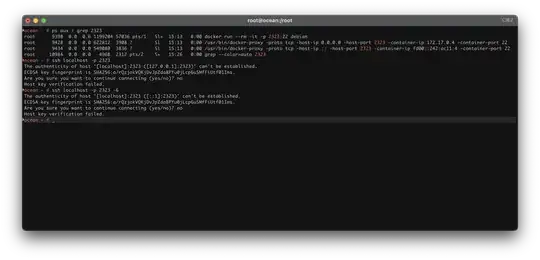My server is running on both IPv4 and IPv6. Docker is running on (local) IPv4 addresses (ie 192.168.100.1/24). I did not enable IPv6 inside daemon.json as I understand that to be rather buggy and requires me to have a full IPv6 /64 range available.
For example, a reverse-proxy nginx docker container is running at superuser.one -- that IP is accessible both over IPv4 and IPv6.
# dig superuser.one +short a
85.17.140.73
# dig superuser.one +short aaaa
2001:1af8:4200:a003:1:aaaa:0:123
And IPv6 is working:
# ping6 superuser.one -c 1
PING superuser.one(2001:1af8:4200:a003:1:aaaa:0:123 (2001:1af8:4200:a003:1:aaaa:0:123)) 56 data bytes
64 bytes from 2001:1af8:4200:a003:1:aaaa:0:123 (2001:1af8:4200:a003:1:aaaa:0:123): icmp_seq=1 ttl=57 time=19.5 ms
--- superuser.one ping statistics ---
1 packets transmitted, 1 received, 0% packet loss, time 0ms
rtt min/avg/max/mdev = 19.526/19.526/19.526/0.000 ms
However, when accessing the webserver (or other services running behind Docker), IPv6 doesn't work:
# curl https://superuser.one -6 -I
curl: (7) Failed to connect to superuser.one port 443: Connection refused
While IPv4 works fine:
# curl https://superuser.one -4 -I
HTTP/2 200
server: nginx
date: Mon, 22 Feb 2021 15:10:37 GMT
[...]
How can I get Docker to listen to the server's IPv6 address and forward the request to the right container (using the regular bridge or host network already set up)?
Edit 1:
ip -6 addr: https://pastebin.com/zKkZW6CE
# docker network ls
NETWORK ID NAME DRIVER SCOPE
4ea1dddd3d64 0x04 bridge local
c6ad6c596ec5 bridge bridge local
5d5ea78ff91f host host local
7a03e7ecb430 matrix bridge local
20cb1fbc5dfe matrix-coturn bridge local
684af653d87a none null local
docker network inspect 0x04: https://pastebin.com/tWYNyM3Y
Edit 2:
I cleared my daemon.json file as I had the following content:
"ipv6": true,
"fixed-cidr-v6": "fd00::/80"
This means I can now correctly run IPv4 and IPv6 connections on my bridge network:
However, this doesn't seem to work with --network option. Most my containers are running in their own network.
